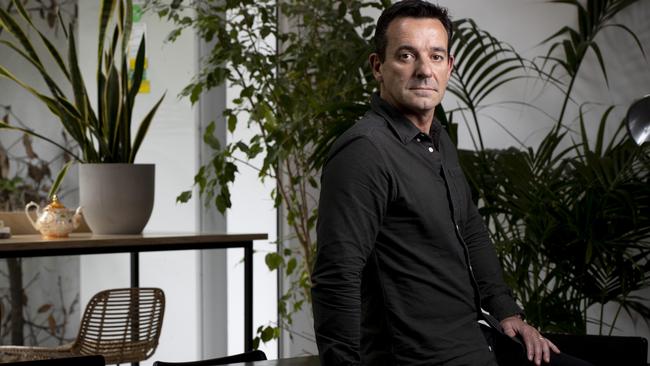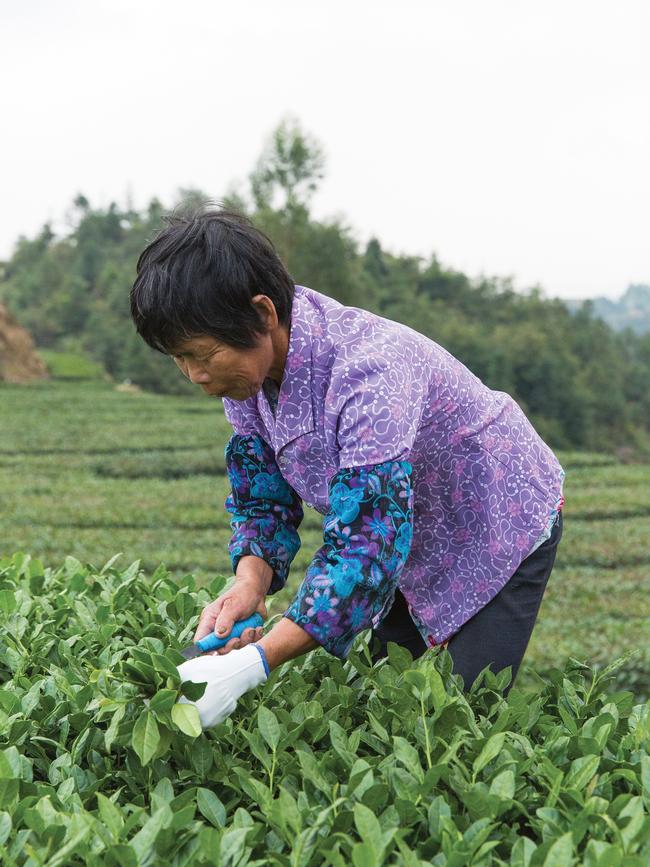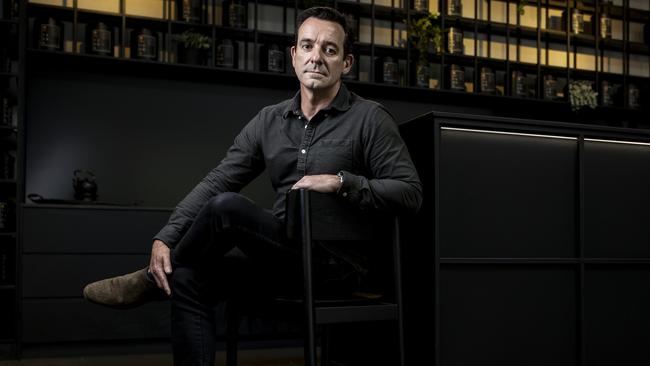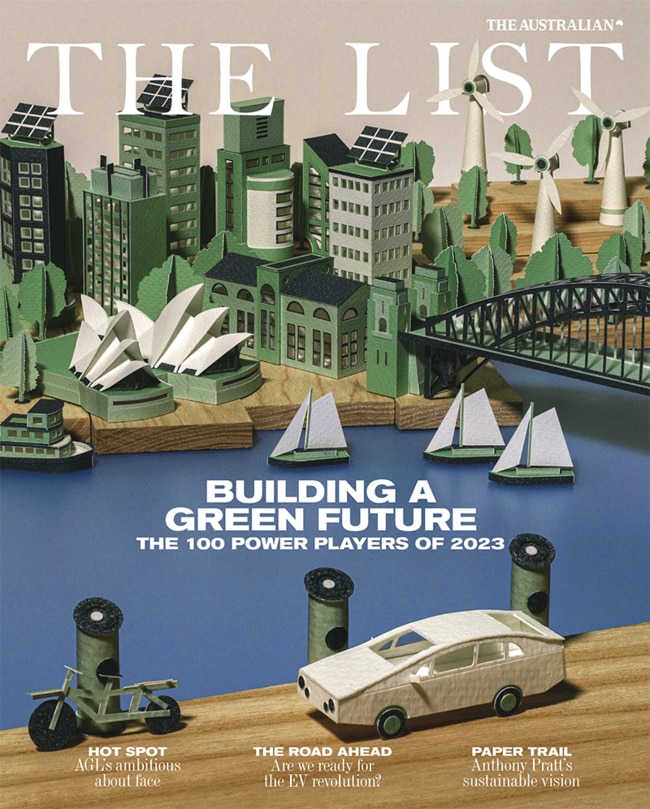T2’s Mike Astin reveals the journey behind getting all tea sustainably and ethically sourced
T2’s noble pledge to ethically source all its tea turned out to involve the biggest ever change to its business model, and a risky remake of its beloved Earl Grey.

Mike Astin calls it one of the most significant moments in the history of T2, the Australian tea company founded in the then grungy Melbourne suburb of Fitzroy on July 1, 1996.
In September last year, T2, which now employs more than 1000 people and operates 70 retail stores across the world – including 60 in Australia – reached its long-awaited, much-anticipated goal of having 100 per cent of its tea blends sustainably and ethically sourced.
It was the culmination of a landmark three-year project, which started when sustainably sourced tea leaves represented less than five per cent of the T2 product portfolio.
Meet the innovators who are leading the transition towards a greener economy in the new edition of The List: Green Power Players, available online and in print on Friday, February 24.
“It was a leap of faith to make such a commitment that we were going to be 100 per cent sustainably sourced for all of our teas and ingredients. Because we didn’t really know what we were actually getting ourselves into.
I don’t think we realised it at the time,” says Astin,
T2’s global director of operations, who has worked with the company for a decade.
T2’s consumers, particularly Gen Y, have been increasingly making purchasing decisions based on sustainable and ethical practices. The pandemic made those customers even more aware of the sustainability of its products. Three quarters of the company’s workforce is also aged under 30.
Astin says the firm faced immense challenges in making the biggest ever change to its business model.
“Tea practices globally are quite sustainable. But that wasn’t the real challenge for us. The challenge was the other ingredients that are in our products. More than 200 ingredients come from over 100 different plants that come from 30 different countries. So that was where the bulk of the work had to happen,” he says.
“We had to reformulate more than a dozen of our products including some of our top-selling brands. Since we have absolute flavour-led brands, that was something that we needed to treat quite seriously, so there was a lot of reformulation, a lot of testing and a lot of sampling before we could actually go to market with some of the changes.”

Three of T2’s main blends – English Breakfast, Earl Grey and Irish Breakfast – are supplied by Akbar Brothers, one of Sri Lanka’s biggest exporters of high-quality Ceylon tea.
Astin says T2 reached out to Akbar in 2020 to inform its biggest supplier of its 100 per cent sustainable tea initiative, which the Sri Lankan firm supported.
Yet while there were sustainably sourced supplies of English Breakfast tea readily available in Sri Lanka, it took many conversations and months of work to convince several Irish Breakfast tea estates in the country to begin the sustainable-certification process.
Initially the process and costs involved in getting the certification did not outweigh the perceived payoff for the estates, but they eventually agreed.
By contrast there were no tea estates willing to make the switch to sustainably sourced certification for Earl Grey, one of T2’s biggest-selling teas, so the firm was forced to undertake a complete reformulation of the popular blend and flavour of the tea to meet its sustainability requirements.
For T2’s top-selling French Earl Grey product, there was also a significant change made to the aesthetics of the tea to make it fully sustainable.
“The key ingredient in that tea is a small purple flower called the mallow flower. The non-sustainable version is quite vibrant in colour and there is no sustainable version that has the same colour. So the mallow flowers that we changed to are of a duller colour,” Astin says.
“There was a lot of testing, sampling and we sourced the products as widely as we could to try to find something. So to become sustainable, we needed to actually change the look of that blend. It doesn’t look as vibrant as it did. But it’s now sustainable.”
The product hit the market in 2019.
“Some customers noticed the change, and we just told them the why. So once they understood the why, we haven’t had any pushback at all,” Astin says.

In total nearly 50 T2 blends had their ingredients modified and some products had 20 different rounds of tastings before a new ingredient was accepted. Ten blends were discontinued because there was no sustainable option available.
“In some cases, we also worked closely with farmers to help them become sustainably sourced,” Astin says.
In T2’s 2021 impact report published in September, which outlines the company’s long-term sustainability strategy and its progress in delivering on its commitment to what it calls “protecting people and planet”, T2 reveals its journey sourcing sustainable lemongrass started back in 2019.
“We looked quite wide to find a suitable lemongrass, and we just couldn’t find one that could replicate our current ingredient. So we worked with a farmer in Thailand to become certified,” Astin says.
The process started with a pre-audit of the Thai firm conducted by UEBT, the organisation that oversees UTZ standard herbs and spices in Thailand, which involved checking production sites and farms. Only minor changes were needed at the various sites and a three-year purchasing guarantee agreement was then committed to in early 2020. The final audit was completed in early 2021 and T2’s UTZ-certified lemongrass arrived midway through that year.
T2’s impact report claims the certified organic lemongrass project helps the supplier in a variety of ways, including to protect biodiversity in cultivation areas, improve soil health and reduce emissions.

Overall Astin says T2’s sustainable sourcing project might be complete, but it has now become a way of doing business, embedded in the company’s supply chains and culture.
And this shift also carries its own challenges.
Ingredient supply is one sector that has been heavily affected by the war in Ukraine on account of changing land use in the war-torn country, while the supply and demand of ingredients also changed significantly during the pandemic.
“The potential to have supply chain disruptions when you are sustainably sourced is significantly higher than when you are not. If there is a weather incident or if it’s a seasonal harvest, that can actually affect global demand and supply of that product, so it can be hard to get hold of,” Astin says.
“So what we are finding is that we are having to change our buying patterns. Some of the ingredients that are now at a higher risk of supply (issues), we need to change the way that we procure and hold those.”
When the sustainable sourcing project was commissioned in 2019, T2 was owned by Unilever, one of the world’s biggest consumer-brands companies. Included in the Unilever stable are the likes of Streets, Dove, Rexona and Sunsilk.
A decade ago Unilever’s Dutch chief executive, Paul Polman, earned a reputation as a global trailblazer when he outlined a 10-year Unilever sustainable living plan
to double the firm’s revenue while slashing its environmental footprint by 50 per cent and sourcing 100 per cent of its raw materials sustainably.
More recently Polman’s successor, Englishman Alan Jope, has outlined a vision for the company to achieve net-zero emissions from all Unilever products by 2039.
Unilever’s brands are also collectively investing a total of €1 billion ($1.54 billion) by 2030 in a dedicated climate and nature fund.
Midway through 2020, Unilever separated T2 into a new $US3bn tea-focused entity called Ekaterra – with a portfolio of 34 brands including Lipton, PG Tips, Pukka, T2 and Tazo – which was last year purchased by global private equity firm CVC Capital Partners.
Astin says while Unilever was an “enabler”, it wasn’t the driver of T2’s push towards sustainability, which started 26 years ago with the firm’s Melbourne founders Maryanne Shearer and Jan O’Connor.
He says nothing has changed under CVC, which sees “value in sustainability being part of our DNA” as the private equity group plans to increase T2’s footprint in the US, UK and European markets.
T2 now looks set to renew its B Corp accreditation – the private certification used to rank for-profit companies’ social and environmental performance – after two years ago becoming one of the biggest retailers with the status in Australia.
The firm’s recently published sustainability impact report reveals it lowered carbon emissions by 14 per cent between 2020 and 2021 as it works towards the goal of being net-zero by 2030.
Other carbon-reduction opportunities under way include moving online deliveries to what Mike Astin calls a “ship from the retail store” model, instead of from distribution centres.
Online sales soared during the pandemic, offsetting about two-thirds of the drop in sales as a result of store closures and subsequent lower foot traffic in Australia and overseas. The new procurement model went live in the first quarter of 2022.
T2 is also looking at improving the utilisation of its international shipping to ensure routes are better optimised, including by making smarter choices on where products are shipped from and how often.
In February 2020 the firm installed solar panels at its Melbourne support office, and clean energy now accounts for more than half the site’s annual energy use.
A total of 85 per cent of T2’s retail stores are in shopping malls and the business is now, where possible, choosing green energy providers at those locations also.
While the impacts of the pandemic hindered the change, half of the retail store network now uses green power, up from 45 per cent in 2020.
Where green energy isn’t available, T2 is offsetting its remaining carbon emissions by being part of the landmark Qantas Future Planet program aligned with Tasman Environmental Markets (TEM), the largest buyer of voluntary market carbon-offset credits in the Asia-Pacific region.
TEM is backed by Kilara Capital, which was established by the private investment arm of the family office of husband-and-wife team Ben Krasnostein and Cassy Liberman, third generation heirs to the respective fortunes of the billionaire Smorgon and Liberman families. More recently Kilara has been backed by the Morris Family Office, the wealth management and philanthropic group established by Computershare founder Chris Morris and his daughter Hayley.
One of the Qantas Future Planet programs is called Arnhem Land Fire Abatement (ALFA NT), an Aboriginal-owned, not-for-profit carbon-farming business that supports traditional owners and rangers undertaking landscape scale fire management. Another is wind-powered renewable energy projects run on farms in India.
Last year T2 also partnered with local startup Greener, which purchases carbon-neutral credits to help its customers reduce their carbon impact.
In 2020 T2 launched its first five green star design review-rated store at Westfield Bondi Junction in Sydney. Sustainable materials are now being used in all new T2 store designs. “In the future every new store will be built under the new sustainable building guidelines,” Astin says.
In recent years T2 has expanded on its diversity and inclusion program, with a strong focus on reconciliation, including collaborating with Indigenous artists for designs on new tea-wares collections.
Astin says T2 is deeply aware that all of its sustainability agenda must be rooted in fact to avoid allegations of greenwashing.
“We do a lot of good in communities on improving sustainability. It is easy to get caught up in that. It can be difficult at times not to shout out from the rooftops,” he says. “We also try to be clear on our intent to avoid greenwashing. We don’t talk just about the outcome, but rather the why and we generally walk the talk.
“There are guard rails in place in the business to make sure we do that.”
He stresses T2’s sustainability agenda is never quantified in bottom-line earnings.
“The goal isn’t to drive profit as such,” he says.
Astin himself is also conscious that the biggest impact he can personally on the planet is through his role at work. But it also extends to his home life. His family home in Melbourne suburbia has solar power, double-glazed windows and drought-proof gardens.
“Our lifestyle is as low impact as it can be, including the way we talk about sustainability at home and value it as a family.”
He has two girls in their early twenties who he says appreciate that he works for a global change agent such as T2. “I know they are proud of it,” Astin says.




To join the conversation, please log in. Don't have an account? Register
Join the conversation, you are commenting as Logout